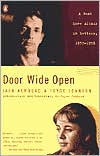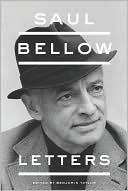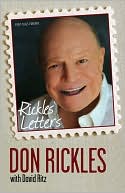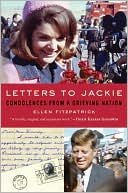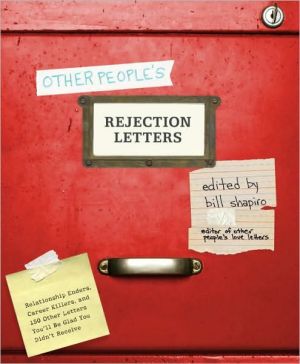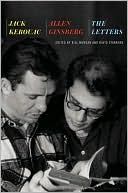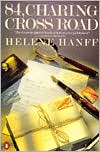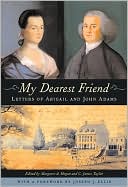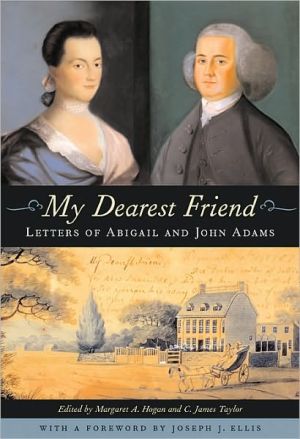Door Wide Open: A Beat Love Affair in Letters 1957-1958
On a blind date in Greenwich Village set up by Allen Ginsberg, Joyce Johnson (then Joyce Glassman) met Jack Kerouac in January 1957, nine months before he became famous overnight with the publication of On the Road. She was an adventurous, independent-minded twenty-one-year-old; Kerouac was already running on empty at thirty-five. This unique book, containing the many letters the two of them wrote to each other, reveals a surprisingly tender side of Kerouac. It also shares the vivid and...
Search in google:
On a blind date in Greenwich Village set up by Allen Ginsberg, Joyce Johnson (then Joyce Glassman) met Jack Kerouac in January 1957, nine months before he became famous overnight with the publication of On the Road. She was an adventurous, independent-minded twenty-one-year-old; Kerouac was already running on empty at thirty-five. This unique book, containing the many letters the two of them wrote to each other, reveals a surprisingly tender side of Kerouac. It also shares the vivid and unusual perspective of what it meant to be young, Beat, and a woman in the Cold War fifties. Reflecting on those tumultuous years, Johnson seamlessly interweaves letters and commentary, bringing to life her love affair with one of American letters' most fascinating and enigmatic figures.Author Biography: Joyce Johnson is the author of three novels. Her memoir Minor Characters won the National Book Critics Circle Award. Her work has been published in major magazines, including The New Yorker, Harper's and Mirabella. Author Biography: Jack Kerouac was born in Lowell, Massachusetts, in 1922 and died in St. Petersburg, Florida, in 1969. Among his many novels are On the Road, The Dharma Bums, Big Sur, and Visions of Cody.Playboy.com - Anthony VenutoloLike Hemingway, writer Jack Kerouac is ingrained into the very fabric of "The American Literary Experience." Where Hemingway was distinguished, Kerouac was cool...pop culture's guy's guy. A hip scribe who thought nothing of hopping a freighter in the middle of nowhere to arrive at an even more remote destination and work as a farmhand, Kerouac would earn just enough for a pack of Chesterfields, a bottle of Dewar's and, possibly, a copy of the newest Charlie Parker LP. He didn't give a rat's ass about conforming. The "nine-to-five" wasn't in his vernacular. That's why Door Wide Open: A Beat Love Affair in Letters, a collection of quite conventional postcards, letters and poems through which Kerouac corresponded with girlfriend Joyce Johnson in 1957 and '58, is so illuminating. Filled with the same literary scatting and spontaneous prose for which Kerouac is best known, Door starts in a Greenwich Village Howard Johnson shortly before the publication of On the Road made him a household name. Broke and womanless, Kerouac, 34, was set up on a blind date with 21-year-old aspiring writer (and beat groupie) Johnson by poet Allen Ginsberg. Interspersed between letters, Johnson's commentary reads almost like guilty-pleasure fiction in this supreme soap opera of star-crossed beat lovers. Door Wide Open is a remarkable portrait of Kerouac as he struggles to cope with his bewildered public, dodge critical attacks against his subsequent works and balance his relationship with the only woman who might have truly understood him.
\ \ \ \ Chapter One\ \ \ The night of our blind date in January 1957, Jack couldn't even afford to buy me a cup of coffee—his last twenty had vanished earlier that day when he'd bought a pack of cigarettes and received change for a five—so I treated him to a hot dog and baked beans at Howard Johnson's. Then he came home with me to my first apartment. As we headed uptown in the subway, we both noticed a catchy new advertising slogan, FLY NOW, PAY LATER, which I found quite relevant to the beginning of this love affair. "You should call your novel that," Jack immediately suggested. (He seemed to like the idea that I too was a writer, although he disapproved of my admiration for Henry James.) We exchanged our first kiss as soon as we were inside my apartment. "I don't like blondes," Jack warned me, coming up for air, but I didn't take this as seriously as I should have.\ I was living at the time in two furnished rooms on the ground floor of a brownstone on 1l3th Street between Broadway and Amsterdam. The following morning I successfully executed a breakfast of bacon and eggs on the rickety two-burner stove in a corner of the living room—cooking was one of my recently acquired skills. Jack had spent his first years in New York living all over this Columbia University neighborhood where I'd grown up, walking these streets discussing Proust and Nietzsche and the "New Consciousness" with Lucien Carr, Allen Ginsberg, and William Burroughs while I was still in pigtails.\ Now that I was drawn into Jack's world, it became harder and harder to show up at the MCA Literary Agency each morning. Nightshad become long and sleepless, full of hard-drinking people of his acquaintance. We often went downtown to visit Lucien Carr, whom Jack considered his closest friend. They had met in 1944, when Lucien was a freshman at Columbia; it was Lucien, in fact, who had introduced him to Ginsberg and Burroughs. At nineteen, according to Jack, Lucien had looked like Rimbaud. But for years he had hidden his beauty behind horn-rimmed glasses with clear lenses and a wispy mustache. In 1944 there had been an incident that would cast a shadow over the rest of his life. On Riverside Drive, with his Boy Scout knife, Lucien had killed an older man named David Kammerer, who had been obsessed with him since his boyhood in Saint Louis and had followed him to Columbia. At Lucien's trial, prominent Columbia English professors had testified as character witnesses, and he had been sent to a reformatory for three years. In many ways, Lucien seemed more "settled" than Jack's other friends. He worked as a night editor for the United Press and had an elegant, weary-looking wife named Cessa and two small boys, who were fascinated by Jack. But I was often aware of an unsettling edge to Lucien's conversation, even though he could be very charming. He had made Jack promise never to write about him, or to mention the Kammerer case to members of the press.\ After seeing Lucien, Jack would never be ready to go back uptown. We would make exhausting tours of the Village bars, running into subterranean characters like Stanley Gould or Bob Donlin, who seemed to be doing little with their lives except drinking and smoking marijuana.\ It was always steadying to go to Elise's apartment in Yorkville and see Allen Ginsberg and Peter Orlovsky, who seemed almost like Jack's brothers. Allen, fresh from his triumphant readings of Howl in San Francisco, was like a brilliant, gleeful general, deploying his troops as he plotted a literary takeover: "Now Jack, tomorrow we're taking the bus to Paterson and going to see William Carlos Williams...." Gentle, blond Peter would make tea for everyone and sweep the floor. They had a rather programmatic way of removing their clothes, but you got used to it, and it wasn't too different from being at the beach. Sometimes I worried about Elise became she'd been hopelessly in love with Allen for years, but she said she now loved Peter too. I knew I could never be as Beat as that.\ Late one night as Jack and I were coming home from the Village, our subway car came to an abrupt jolting stop just as it began to pull into the Ninety-sixth Street Station. A man had jumped onto the tracks. As soon as the doors of our subway car opened, we fled the station and walked home. Jack was ashen, unable to speak, as if the suicide were an omen, or as if he'd been implicated in the death of this stranger.\ During these first weeks of our relationship, Jack didn't seem especially excited about the forthcoming publication of On the Road in the fall and The Subterraneans the following spring. It seemed as if he'd waited too long. On the Road, especially, had become old to him; he'd moved on from there, written many other books since 1951, all of them "published in Heaven," as Allen had written in the dedication to Howl. Mostly he seemed to feel weary relief at the prospect of having a little money in his pocket. He told me how he'd promised his father that someday he'd buy his mother a house—maybe he'd really be able to do that eventually. He also hoped critics would admire his breakthrough into spontaneous, unfettered prose. Although there had been rumblings of unusual interest in the Beat Generation writers ever since Ginsberg's historic reading of Howl at the Six Gallery in San Francisco a few months before, Jack had no idea of the furor that would await him in September 1957.\ For the time being, work on my novel came to a halt. Why was I writing about a silly college girl instead of something really important? The fact that I was getting a lot of encouragement from Hiram Haydn, the editor in chief at Random House (I'd begun the novel in a workshop he taught at the New School), only seemed to increase my uncertainty. What would it mean if Haydn actually bought it? Why should I have it so easy when Allen and Jack had found it so difficult to get published?\ I'd begun to feel I was living at an incredibly accelerated speed. One of my bosses at MCA said he'd noticed a great change in me. He was sort of a dead soul who had wrecked the literary talent of his youth by becoming king of the True Confessions writers; sometimes he'd buy me drinks and morosely talk about the tragic mistakes he'd made for cash.\ "Yes, something's happened to you, and I don't know what it is."\ "I'm Jack Kerouac's girlfriend." I knew he'd been following the recent articles about the underground writers of the so-called San Francisco Renaissance.\ He put his hand on my forehead. "Why, you're burning up," he said wistfully.\ My weeks with Jack passed all too quickly, as far as I was concerned. Ahead, like a cement wall, his departure date loomed. Except for one night when he went to see his brunette ex-girlfriend Helen Weaver and stayed too long, and I made him come home with me—"It's her or me," I said, collecting him in a cab where he sat helplessly laughing at my audacity—we were getting along fine. But he had never planned to stick around. William Burroughs was waiting for him in Tangiers, ready to show him the manuscript of Naked Lunch, which Jack was going to type up for him, and Allen had already paid for his passage on a freighter.\ On February 15, Jack sailed for Africa.\ \ \ * * *\ \ \ \ [aboard the S.S. Slovenial]\ [early March 1957]\ \ Dear Joyce—As I write this we're only 8 miles from the African coast & will be in at dusk—It was a good thing you didnt come back on the ship with me because it only went to big gas tank barges off Perth Amboy—Also because I went to Lucien's alone, they were able to squeeze me in at his mother's little dinner, where I ate a pint of vanilla ice cream covered with creme de menthe and been feeling good ever since—Our books turned out fine—ten days at sea studying history & Kierkegaard have opened new cracks in my mind—I'm saving Genji for Spain—Fresh sea air, sleep, walking on deck, sun, & now I'm my old self again (the healthy Jack you never saw)—Rarin to go in Tangiers, the Blue Pearl of the Hesperides—the city of vice! whee!\ This is also by way of being a greeting to Allen, Peter, Ellyse [sic] and [Sheila]—All during the trip I ate alone at a huge white tablecloth with one mysterious Yugoslavian woman Mata Hari—We had a dangerous storm 500 miles out & almost foundered.... in all my years as seaman I never saw my ship bury its nose in mountain waves & plunge up into other valleys like a rowboat.... it was awful, we had to flee South & lose a day—\ During this ordeal, I heard the words:—\ EVERYTHING IS GOD, NOTHING EVER HAPPENED EXCEPT GOD—and I believed & still do.\ Kierkegaard & the storm together made me see this luminous peaceful truth—You must read FEAR AND TREMBLING (never mind SICKNESS UNTO DEATH, which is an abstract discussion of despair)—F&T is about Abraham & Isaac & made me cry—\ At moments I was sad remembering your tears—we'll meet again—\ * * *\ Tangiers—wow! Immediately Bill Burroughs took me to the Casbah where the veiled women pass—I was so high I thought I'd seen it all before—He lives on a hill overlooking the bay where even now I can see the S.S. Slovenia docked—We smoke marijuana right in the cafes, in public, it's legal—a strange wild Arab town—old as time—\ Very excited I am—I'll get me a room of my own & write—bright sunshine this morning, cries of Arab peddlers, & tonight again the mysterious Casbah & that whanging music—Write soon & let me hear the latest. Love, Jack XXX\ X\ For\ TiGris\ \ \ \ Monday, March 11, 1957\ Dear Jack,\ It was lovely to get your letter. You sound fine—absolutely golden. I'm glad.\ I've had a frantic time of it this month—looking for a job. I finally have one, start Thursday. But guess where it is?—Farrar, Straus & Cudahy! I'll be working for [John] Farrar, who is a sweet, neurotic, tweedy old man, who dates back from the Maxwell Perkins days in publishing. I met him on Ash Wednesday, and he had an ash on his forehead. He said to me, "Don't be alarmed, Miss Glassman. It's only Anglican ash." I don't know whether this augurs good or ill, but anyway I'm delighted to be through with MCA. It's funny, but I think if I hadn't known you, I wouldn't have been ready to quit MCA yet. You and the great beautiful freedom you have reminded me of myself and what I really wanted—all of this had become terribly mixed up with snobbish, ridiculous, theatrical ideas of some vague kind of glittering power—but I don't want to be a literary agent, I'm too young, and besides I really do want to be a writer, and I shouldn't get all involved with anything else. I know that getting another job in publishing doesn't sound to you like a very radical step, but the point is that this is just a nice, quiet job that won't lead anywhere—and I don't care! Now I can look at a job as something that pays the rent, keeps me alive—nothing more, and I can get up and walk out of it if I want to! For me this is somehow an enormous revelation.\ I've thought a lot about your letter—about your finding God in the middle of the storm. I can't really comprehend that—I want you to know that about me. I scramble from day to day, hour to hour, and I seldom stop to ask questions, because when I do, I find everything in the world senseless, without reason, and it terrifies me. I am not defending myself; I am simply telling you this. I look at your way with wonder—but there is nothing I can say to you about it, except that. And in the meanwhile, I move two miles downtown to a new job, not too different from the old one, and you move across the ocean to another continent!\ Shall I tell you some news? Allen and Peter sailed Saturday after being delayed for weeks because of the tugboat strike. Elise and [Sheila] are now taking over the negotiations about Nicky and Julius [Orlovsky]—all of which is awfully complicated and doesn't look too hopeful—Nicky is being uncooperative, saying that no one can prove him sane because he is sane, etc., which doesn't help much. I've met Lafcadio [Orlovsky], who's wonderful, interested and curious about everything: the first question he asked me was "Were you living with Jack?"; the first question he asked Elise was "When are you getting married?" —all this, while looking very stern and self-contained. The two Helen's are no longer talking to each other—Helen W. moved out and Helen E. asked me to live with her. I refused—I really do like being alone, except for having you around, which was fine. Elise won't move in with me, after all. The 1st issue of the Evergreen Review came today, and I guess the second will be along soon. I can't think of any other news. I will try to get to a Post Office this week and send you the two articles—I'm terribly bad about mailing things. It was funny to read about you: there you were all printed up, called a "frantic Buddha" and compared to Celine, et al., and I remembered you leaning on a garbage can, eating pizza and saw your red shirt lying on the rocking chair, still smelling of you even though you were thousands of miles away.\ Well, tell me all about the city of vice.\ \ Love,\ Joyce\ \ * * *\ \ \ It did seem a truly wild coincidence to land a job at Farrar, Straus & Cudahy. Two people there had important connections to Jack. The editor in chief was Robert Giroux, who had published Jack's first novel, The Town and the City, at Harcourt, Brace, wining him and dining him for a number of years but reacting with dismay when Jack came to his office and triumphantly unfurled the newly typed scroll of On the Road. In a blind rage, Jack had rushed out of Giroux's office, taking the scroll with him. When Jack later gave his editor a chance to read a retyped manuscript, Giroux had compared it to Dostoievsky, but said he was positive the company would reject it anyway on the grounds that it was too unusual and controversial. Jack was still quite bitter about this outcome.\ Helen Weaver, whom Jack was still a little in love with, I suspected, worked in the production department of my new employer. Helen seemed to be my nemesis (or maybe I was hers), but I couldn't help liking her and we gradually became office friends, avoiding the subject of Jack.\ Allen and Peter had set sail for Tangiers in early March. They delegated to Elise and her roommate Sheila, who had become Peter's girlfriend during their visit to New York, the responsibility of looking out for Peter's brothers. Nicky and Julius Orlovsky were both in mental institutions; Elise and Sheila were supposed to help Nicky get released—how, they didn't quite know. Elise was especially concerned about sixteen-year-old Lafcadio, who had been living with Allen and Peter in San Francisco and was now back in Northport, Long Island, with his mother in dangerously isolated circumstances.\ \ \ * * *\ \ \ [Tangiers]\ MARCH [?] 19.... Dear Joyce: Only just got your letter due to slow sloppy mailsystem at the American Legation ... a month late.... From now on write to me at this hotel address ... & I will get your letters in 4 or 5 days at most ... very charming to hear from you, very pleased.... Allen is arriving here in a few days and we will row out in a boat to meet his ship ... we row often, in the bay ... I take long walks to see the ancient fishermen pulling nets with a slow dance ... there are many dull expatriate characters here I try to avoid mostly ... not too many good vibrations in Tangier and the Arabs very quiet send out no vibrations at all so I spend most of my time musing in my room ... somehow can't write here but anyway that can wait ... what I'm actually doing is thinking nostalgic thoughts of Frisco ... not too interested in this oldworld scene, as tho I'd seen it before plenty ... anyway in early April I'm off by myself to Paris, the others can join me later, to get cheap garret ... then London, Dublin, Brittany ... then I try to get job on freighter, work my way back this summer ... I just dont seem interested, got too much to do in America, shouldna come at all of course ... so I'll likely be seeing you in NY in July maybe ... look forward to seeing you, lonely here, dont like whores anyway and no girls speak English ... mostly fags abound in this sinister international hive of queens ... have had everything in the books, smoked opium, ate hasheesh, don't want any of it, just musing in my room, lights out, face sea, moon, liquid lights of anchored ships in bay, good enuf ... the blink of lonely headland lighthouse.... Grove Press really pulled a fast one on me and cut the novel subterraneans by 60 per cent of all things and ruined swing of prose so I wrote and called it off ... I will not stand for any more of this castration of my careful large work by liverish pale fag editors ... you know my first novel Town and City in original ms. form was 1100 pages and ranked with five of the greatest books ever writ in America (this I believe) but after Harcourt Brace cut it over 50 percent to save paper, and ruined rhythm of sentences, it was like 2 or 3 thousand any-other novels a lil better than average ... so the time has come to put my foot down on this editorial activity ... no such action goes on in France, where young writers are published in toto ... only the french have nothing to say because the Old World is weary.... You said you would airmail Nation and Village Voice articles, or did you, or is Allen bringing them anyway? ... O well who cares, they say this and that about a writer but it doesn't prevent them from trying to castrate too.... Oh, I reckon by now you got my first letter to you? about the trip on the boat and the big storm and Yugoslavian woman I ate with and the books I read? curious to know, when you answer, let me know if you got that okay.... Your story about Five Spot amusing and the story about Tigris eating dandelions, what a cat (daffodils) .... I'm curious to visit Brittany and find out what my father changed the name Keroach for, because I see there was a Breton Admiral called Ronarc'h so that it would be Keroac'h if he was correct.... On sunny mornings I sit crosslegged on my patio and read diamond sutra facing the Catholic priests of nearby church who stand in gangs reciting their rosaries facing the sea but I face the Heliolithic sun, hor.... Sometimes I spend all night comparing my newfound utter listless dispiritedness and no-care of where I am, what I do, to enthusiasm of old American writers like John Muir, Timrod, Twain, etc., the vigorous activities of other men abashing me, as tho I had never written a line myself.... But since found out, we were all poisoned by the hasheesh, which has arsenic in it, because of spray, so that explains my so-far dispirited visit in Tangier and feeling of no vibrations.... I drink most delicious wine in the world, which costs 28 cents a quart, Malaga, sweet molassey wine from Malaga across these straits in Espagna.... Vision one afternoon: "All things that move are God and all things that dont move are God," and at the reutterance of this ancient secret all things that moved and made noise seemed to suddenly rejoice and all things that didnt move seem pleased! ... Eat in marvelous French restaurant serving everything great, for one dollar, four courses, amazing menu, truffle casserole in cheese, etc., dainty pastries, impossible hors d'oeuvres, a pretty white cat sits on my lap as I eat, the proprietor insists I finish all my potatoes....\ \ Write soon, honey Love\ Jack\ \ \ \ * * *\ \ \ I remember being taken aback by Jack's matter-of-fact line, "dont like whores anyway and no girls speak English." It was as if he'd forgotten for a moment whom he was writing to; our friendship was certainly quite different from the ones he had with Lucien or Allen. But I decided not to probe into the question of whether or not Jack was seeing other women—a policy I would later try to stick to with much greater difficulty. I had to keep reminding myself that I couldn't really wait for Jack to come back to me, since who knew if he would?\ All at once I'd begun to meet many new people—the painters and poets who congregated at a nondescript-looking bar on University Place called the Cedar Tavern not far from the Union Square offices of Farrar, Straus & Cudahy. For years the Cedar had been the haunt of Jackson Pollock, who had died in a car accident in 1956, and other abstract expressionist painters. I began walking down there each day on my lunch hour and was soon introduced to Franz Kline and Willem de Kooning and a younger group of artists and writers, including Fielding (Fee) Dawson, Basil King, John Chamberlain, and Joel Oppenheimer, who had all studied at Black Mountain.\ Black Mountain was a small arts college in North Carolina, where the educational experience had evidently been so heightened, incestuous, and intense that nobody who'd gone there could ever stop talking about it. When the institution went spectacularly bankrupt in 1956, a small group of diehards had stayed on, keeping warm by burning chairs in fireplaces, eating steaks stolen from the local supermarket. Finally the diehards had given up—half of them driving west toward the San Francisco Renaissance in North Beach, half of them heading north for downtown Manhattan and the Cedar. The final issue of the Black Mountain Review, due to be published early in 1958, would feature a contribution from Jack: "The Essentials of Spontaneous Prose." There was something about Jack's theories about bop prosody that reminded me of the new action paintings I was seeing, where the colors seemed danced upon the canvas in vibrant strokes with surprising explosions and little showers of paint as delicate as rain.\ Many of my new acquaintances didn't live in apartments like most New Yorkers. Instead they inhabited old commercial lofts illegally, hiding their mattresses in ingenious ways in case a building inspector came to check the premises. On Friday nights, everyone turned up at openings at the cooperative storefront galleries on Tenth Street, where works by unknown artists excluded from the snooty galleries uptown were being exhibited in exuberant group shows. The next stop would often be the Five Spot, the new Bowery jazz joint whose walls were covered with flyers from the neighborhood galleries. I began going there with Elise. We'd buy our 25-cent beers and listen to John Coltrane. We were there the unforgettable night Billie Holliday suddenly stood up at her table and sang as Mal Waldron played the piano. (She had recently been deprived of her cabaret card by the police.) I'd always longed to go to Paris—the destination of the heroine in the novel I was writing—but now there was something in the air that made New York seem the most exciting place in the world.\ \ \ * * *\ [Tangiers]\ [late March]\ \ \ Dear Joycey—\ Am now leaving for Paris & Allen & Peter will take over my lovely patio room—"April in Paris" is all I keep singing (AT LAST)—Your vision of the Casbah, with palm trees and Legionnaires riding through, must come from an old Ronald Colman movie!—it's really called the Medina (The Casbah is the wailed fort, cobblestones with one antique cannon), the Medina is full of narrow damp alleys, robed Arabs, vegetable stands, smoke of frying fish & Allen Ginsberg wandering around looking for asparagus—(romantic enough)—When I said "God" in my vision in the sea I didn't mean a bearded man in Heaven, I meant THAT WHICH PASSES THROUGH ALL ("Should anyone looking at an image or likeness of that which passes through all claim to know that which passes through all and should offer worship and prayer thereto, you should consider such a person an idolater who does not know truly that which passes through all." DIAMOND VOW OF WISDOM)—Then "Do not think the opposite either that when that which passes through all passes through knowing perfectly through all, it is not by means of its ability to pass through various kinds of excellent form.... [you] should neither grasp after such verdicts of the appearance of things nor reject them."\ —Which, if you said it to the college crowd, would pass through one ear and out the other, as is proper and fitting—What are you doing at Farrar, Straus? Met Giroux yet? You might tell Giroux for me that Andre Deutsch, a new English house, has just bought On the Road & tell Bob that I'll go to London & look up Frank Morley—(Christopher's brother)—Is Helen Weaver still at F. Straus?—What a blue sea out there today, the cerulean blue I always dreamed for the Mediterranean—Today I'm making a reservation on the packet to Marseilles, then hitchhike to Paris—Who is going to be your publisher for your novel?—Yesterday I hiked 10 miles alone & climbed mountain, & sat on hillsides watching Berber villages—At night, flutes over the rooftops—Be seeing you in New York before 4th of July\ \ Love, Jack\ \ \ \ April 14, 1957\ Dear Jack,\ How is April in Paris—I guess you're there by now—I saw it in the newsreel last night: fireworks, dancing on the Seine, processions and crowds. Is it really like that? You were right—I guess my vision of the Casbah was more a vision of Hollywood than anything else.\ April is cold here, with snow dropping shamelessly on the forsythias in Central Park, which isn't fair. But Columbia is very green and sleepy already.\ What I am at Farrar, Straus is an "editorial secretary." I type, read manuscripts, etc. Quite peaceful. My boss is Mr. Farrar, an old man left over from the 20's (I read some poetry written in his heyday in '24—"I'll filch the golden pollen / From half a million bees, / And I'll dust it on some quiet bloom / Before she even sees." Etc., etc.—awful!) But he's a sweet old guy, suspects me of being "somewhat of a rebel"—he invited me to go to the P.E.N. Club tomorrow and asked me would I mind not wearing slacks—which is what he thinks all female rebels wear—so, dressed as comme il faut as possible, I shall go there and dig what happens to you when you become an old established writer. Mr. Giroux with his large, heavy white head is very very impressive. So far we have just mumbled good morning at each other and once he corrected my punctuation. Jack, he makes me feel terribly shy for some reason. Helen Weaver is still at FSC—we've become office friends, which is nice. The funny thing is that she's going out with Donald Cook now (remember, you met him in the West End and said he had an urchin's face) and I had gone around with him for two years. Incest again! The good thing about FSC is that for two hours each afternoon, I have nothing to do, and so I've appropriated that time to work on the book. I'm writing faster now, revising less, and there is much more dialogue, and I'm finally getting used to the sound of my own voice and finding out that I have one. Hiram Haydn is still interested and my agent is going to tackle him for an option when the workshop is over. If I don't get one, she wants me to try for a Houghton Mifflin Literary Fellowship.\ How lovely about the English edition! Has anything more happened with Grove Press—or is that deal completely finished? Are you writing A DHARMA BUM IN EUROPE now?\ I went to hear Miles Davis, who is playing at the Cafe Bohemia in the Village. He's really fine—beautiful crazy lines floating on top of each other. He stood up very straight and looked stern. The place was packed, but silent as a cathedral—everybody at the bar looked sad and a little apprehensive and there was a weeping girl with a cat's face wandering back and forth looking for jazz musicians. Then—all of a sudden, a car smacked up across the street between a house and a lamppost. The people in the front seat were trapped but giggling. A man at the bar cried "Crazy? threw up his arms and ran out into the street, followed by everybody except Miles Davis who kept playing. He finished and said quietly, "Thank you for the applause," and walked off. It was like a dream. I felt a little sick and went all the way uptown to Columbia and found the cat sleeping with his eyes open and rolled back into his head. I read some Jane Austen and went to bed and had a dream about being put into a prison for wayward girls and not being able to get out ever because it was supposed to be good for me.\ Aside from the dream, I find that I've been pretty calm and happy for around four consecutive months now, which is sort of a record for me. Don't know why and won't ask too many questions. I'm not a questioner and not a believer either—that's all I meant when I wrote you about your vision of God (not a bearded man in heaven!). You are both a believer and a seeker, and to me it is the ability to seek or believe that is important, not what is sought or believed in. Is this any clearer? I've read and reread what you quoted from the Diamond Vow of Wisdom many times and the meaning keeps expanding and expanding.\ Hope Paris is as beautiful as the songs promise and as wild as Henry Miller and that you are happy.\ Are you really coming back in July? It would be great to see you.\ \ Love,\ Joyce\ \ P.S. Am sending you the article Louise Bogan wrote on Frisco writers.\ \ \ Would have written sooner, but wanted to wait till you got to Paris. Superstitious about the mails & American legations, etc. Very silly!\ \ \ 4/15 Since writing this I've gone [to PEN] & discovered it's much better to remain a young unestablished writer, if you're going to end up that stuffy!
\ Anthony VenutoloLike Hemingway, writer Jack Kerouac is ingrained into the very fabric of "The American Literary Experience." Where Hemingway was distinguished, Kerouac was cool...pop culture's guy's guy. A hip scribe who thought nothing of hopping a freighter in the middle of nowhere to arrive at an even more remote destination and work as a farmhand, Kerouac would earn just enough for a pack of Chesterfields, a bottle of Dewar's and, possibly, a copy of the newest Charlie Parker LP. He didn't give a rat's ass about conforming. The "nine-to-five" wasn't in his vernacular.\ \ That's why Door Wide Open: A Beat Love Affair in Letters, a collection of quite conventional postcards, letters and poems through which Kerouac corresponded with girlfriend Joyce Johnson in 1957 and '58, is so illuminating. Filled with the same literary scatting and spontaneous prose for which Kerouac is best known, Door starts in a Greenwich Village Howard Johnson shortly before the publication of On the Road made him a household name. Broke and womanless, Kerouac, 34, was set up on a blind date with 21-year-old aspiring writer (and beat groupie) Johnson by poet Allen Ginsberg.\ \ Interspersed between letters, Johnson's commentary reads almost like guilty-pleasure fiction in this supreme soap opera of star-crossed beat lovers. \ \ Door Wide Open is a remarkable portrait of Kerouac as he struggles to cope with his bewildered public, dodge critical attacks against his subsequent works and balance his relationship with the only woman who might have truly understood him.\ —Playboy.com\ \ \ \ \ Denver PostDoor Wide Open offers an interesting look at women in that world in a manner that is never tedious or, worse, preachy. While no knowledge of the Beat canon is needed, this book -definitely not cut from the kiss-and-tell school - is an excellent introduction and a good, crisp read.\ \ \ New York Times Book ReviewWonderful...conveys Johnson's own growth as a woman and writer in the 1950s, absorbing Kerouac's remarkable freedom.\ \ \ \ \ Publishers Weekly\ - Publisher's Weekly\ In a hip, literate correspondence marked by high diction and '50s slang, 21-year-old Johnson (born Glassman) and 35-year-old Kerouac chart the flowering of the Beats and their complicated love affair. An initial matchmaking move by Allen Ginsberg led to Johnson's and Kerouac's first meeting in Greenwich Village, followed by 22 months of romance, withdrawal and, eventually, friendship. Through her understated commentary and narrative links, NBCC-Award winner Johnson (Minor Characters) provides tender insight into Kerouac's troubles, particularly his unease at becoming the Beat spokesman with the 1957 publication of On the Road and his "convoluted attachment" to his mother, Memere, which made it impossible for him to sustain relationships with other women. Johnson's presence throughout makes the story hers--that of a sheltered Barnard grad who considered writing "an illicit and transgressive act" and who must have found in Kerouac a kindred soul. Yet it was her desire for a more lasting union than Kerouac would give that led to their breakup: "`You're nothing but a big bag of wind," she told a dallying Kerouac, and left. Although the Kerouac romance dominates the text, the author's brief description of her happy marriage to James Johnson, which ended with his death in a motorcycle accident, puts the affair in perspective and shows readers a greater reason for the sadness that suffuses the book. First serial to Vanity Fair; 3-city author tour. (June) Copyright 2000 Cahners Business Information.\|\ \ \ \ \ Library JournalIn January 1957, 21-year-old Joyce Johnson (then Glassman) met and fell in love with Jack Kerouac. These letters chart the course of their unsteady relationship over the better part of two years. By her own admission, Johnson was "naively, dangerously romantic," a firm believer that love could conquer all. Considerably older and twice divorced, Kerouac harbored no such illusions--making the love affair fairly one-sided. Although his letters frequently express affection and concern, Kerouac is always wary of making a commitment. Burdened by his new-found celebrity after the publication of On the Road (1957), he seems intent on retreating from life, while Johnson yearns for love and adventure with an open heart. These letters, amplified by Johnson's commentary and insightful analysis, make for absorbing reading and add a new dimension to Johnson's portrayal of the affair in her award-winning memoir, Minor Character (LJ 1/15/83). Highly recommended.--William Gargan, Brooklyn Coll. Lib., CUNY Copyright 2000 Cahners Business Information.\\\ \ \ \ \ Internet Book WatchDoor Wide Open is a gathering of love letters between two major figures of the Beat Generation presents works written between 1957-58, exchanged in the course of an on-off relationship across countries. A side of Kerouac's personality not previously viewed is observed in the course of these letters.\ —Internet Book Watch\ \ \ \ \ Paul EvansComing across as more of a boor or baby than the Buddha he strived to be, Jack Kerouac haunts this bittersweet romance. Johnson, a gifted memoirist (Minor Characters), recounts charitably her year's amour with the "King of the Beats," circa On the Road. A deft sketch, in her sharp phrase, "of the bland and sinister 1950s," it finds a wannabe desperado colliding with the genuine article--Jack waxes ecstatic, breaks dates, sees God, runs to Mama. Joyce endures. What remains moving is less the book's portrait of self-destructive genius than its simple elegy for the end of an affair.\ \ \ \ \ Vince PassaroSome readers of this wonderful new collection of letters between Johnson and Kerouac, Door Wide Open, will feel a bit uncomfortable with the recognition that the young Joyce Glassman (Johnson's maiden name) -- more than a decade Kerouac's junior, a bourgeois Barnard girl who'd rarely left the Upper West Side, never mind the continent, and an artist who, unlike Kerouac, found respect but little fame or fortune -- by 1957 was already a better writer than he was. \ —The New York Times Book Review\ \ \ \ \ Kirkus ReviewsAn annotated collection of letters exchanged between novelist Johnson (In the Night Café, 1989, etc.) and Kerouac (1922-69) during the two years (1957-58) of their stormy (and not terribly romantic) love affair. When Johnson met Kerouac in 1957, she was only 21 (Kerouac was 34), had recently left Barnard, and was living on her own while working at a dreary job in a literary agency. An aspiring novelist, she was passionately drawn to the moody, French-Canadian Kerouac, who had already published one novel but had yet to achieve the fame that he would soon win with On the Road. Although it is difficult to see (in either the letters or her annotations) what satisfaction Johnson was able to take from her relations with Kerouac—who appears as continually drunk, quite remarkably insensitive, and utterly ungrateful to his adoring young acolyte—her collection provides an intimate glimpse of the writer at just the moment when he began to achieve (and, in some sense, be ruined by) his fame as one of the leaders of the Beat Generation, and it will be welcomed by all scholars and fans of that movement. A depressing but fascinating account of one of the sadder figures of modern American letters.\ \
